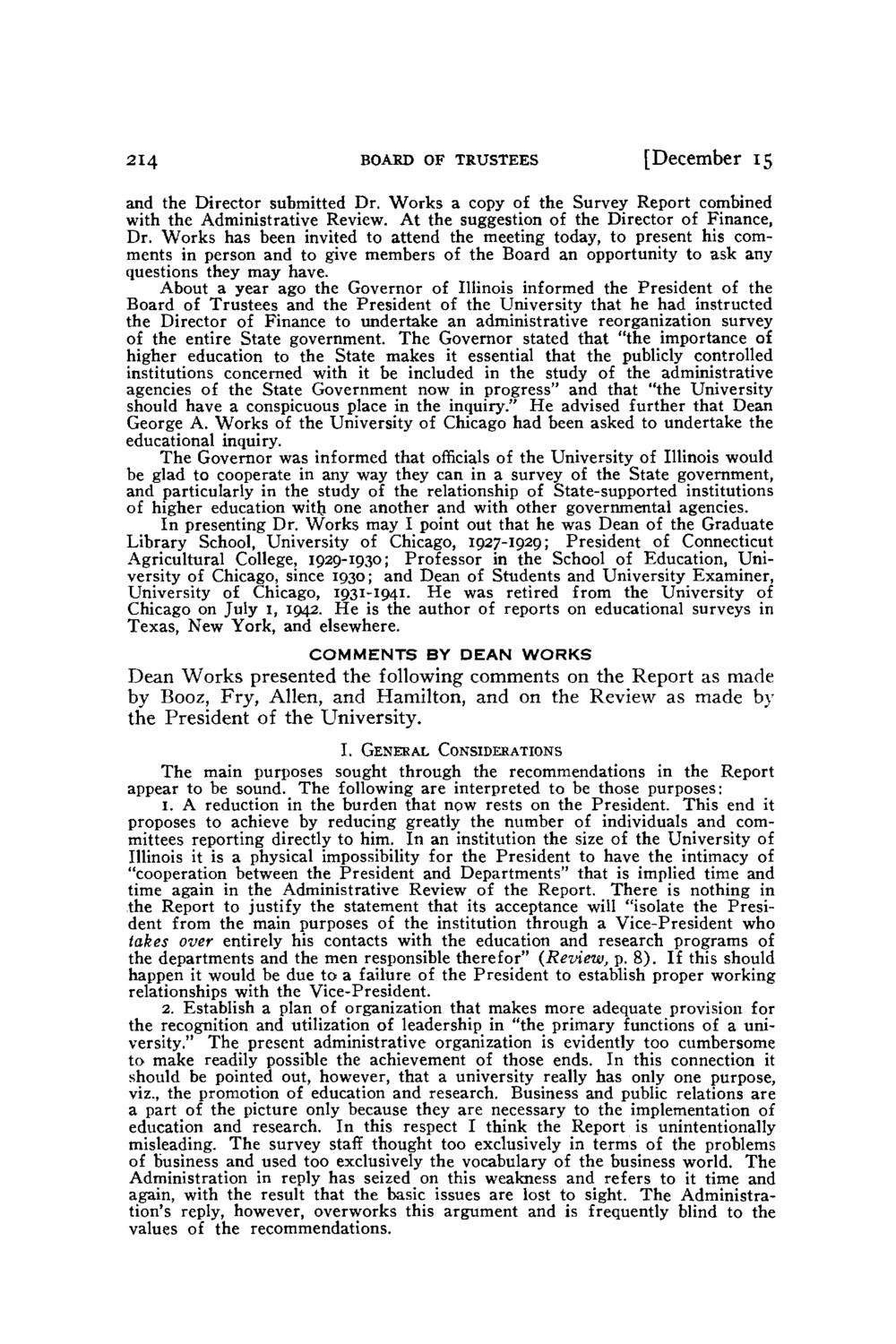| |
| |
Caption: Board of Trustees Minutes - 1944
This is a reduced-resolution page image for fast online browsing.

EXTRACTED TEXT FROM PAGE:
214 BOARD OF TRUSTEES [December 15 and the Director submitted Dr. W o r k s a copy of the Survey Report combined with the Administrative Review. At the suggestion of the Director of Finance, Dr. W o r k s has been invited to attend the meeting today, to present his comments in person and to give members of the Board an opportunity to ask any questions they may have. About a year ago the Governor of Illinois informed the President of the Board of Trustees and the President of the University that he had instructed the Director of Finance to undertake an administrative reorganization survey of the entire State government. T h e Governor stated that "the importance of higher education to the State makes it essential that the publicly controlled institutions concerned with it be included in the study of the administrative agencies of the State Government now in progress" and that "the University should have a conspicuous place in the inquiry." H e advised further that Dean George A. W o r k s of the University of Chicago had been asked to undertake the educational inquiry. T h e Governor was informed that officials of the University of Illinois would be glad to cooperate in any way they can in a survey of the State government, and particularly in the study of the relationship of State-supported institutions of higher education with one another and with other governmental agencies. In presenting Dr. W o r k s may I point out that he was Dean of the Graduate Library School, University of Chicago, 1927-1929; President of Connecticut Agricultural College, 1929-1930; Professor in the School of Education, University of Chicago, since 1930; and Dean of Students and University Examiner, University of Chicago, 1931-1941. H e was retired from the University of Chicago on July I, 1942. H e is the author of reports on educational surveys in Texas, New York, and elsewhere. COMMENTS BY DEAN WORKS Dean W o r k s presented the following c o m m e n t s on the R e p o r t as made by Booz, F r y , Allen, and Hamilton, and on the R e v i e w as m a d e by t h e P r e s i d e n t of t h e U n i v e r s i t y . I. GENERAL CONSIDERATIONS T h e main purposes sought through the recommendations in the Report appear to be sound. T h e following are interpreted to be those purposes: 1. A reduction in the burden that npw rests on the President. This end it proposes to achieve by reducing greatly the number of individuals and committees reporting directly to him. In an institution the size of the University of Illinois it is a physical impossibility for the President to have the intimacy of "cooperation between the President and Departments" that is implied time and time again in the Administrative Review of the Report. There is nothing in the Report to justify the statement that its acceptance will "isolate the President from the main purposes of the institution through a Vice-President who takes over entirely his contacts with the education and research programs of the departments and the men responsible therefor" {Review, p. 8 ) . If this should happen it would be due t o a failure of the President to establish proper working relationships with the Vice-President. 2. Establish a plan of organization that makes more adequate provision for the recognition and utilization of leadership in "the primary functions of a university." T h e present administrative organization is evidently too cumbersome t o make readily possible the achievement of those ends. In this connection it should be pointed out, however, that a university really has only one purpose, viz., the promotion of education and research. Business and public relations are a part of the picture only because they are necessary to the implementation of education and research. In this respect I think the Report is unintentionally misleading. T h e survey staff thought too exclusively in terms of the problems of business and used too exclusively the vocabulary of the business world. T h e Administration in reply has seized on this weakness and refers to it time and again, with the result that the basic issues are lost to sight. T h e Administration's reply, however, overworks this argument and is frequently blind to the values of the recommendations.
| |